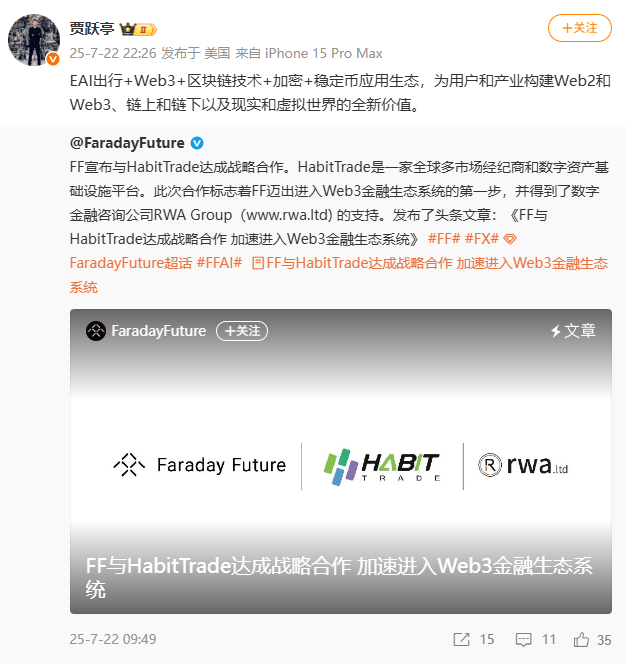Written by: Luke, Mars Finance
In the world of capital, some people are responsible for making money, some for cashing out, while Jia Yueting seems to only be responsible for providing topics. The promise of "returning to China next week" may be far off, but he always manages to find a brand new, jaw-dropping narrative pivot between the jokes of Chinese netizens and the sad reports from his U.S. stock investors.

As Faraday Future (FFAI) struggles on the life line of $1, and the whole world measures its car manufacturing achievements (a total of 13 deliveries by mid-2025) by counting, Jia once again lives up to expectations by throwing out a "new script" that feels absurd yet intriguing to both Wall Street and the crypto circle: a full-scale entry into Web3.
In July 2025, an announcement linked Faraday Future with a global brokerage named HabitTrade, claiming to "accelerate entry into the Web3 financial ecosystem" and "unlock new possibilities in capital markets." Once the news broke, the market fell into a familiar confusion. Why would a company that struggles to even mass-produce cars dive headfirst into the nebulous world of Web3? Is this yet another "ecological transformation" story crafted in the face of desperation, or is it another capital magic trick prepared by Jia Yueting?
To understand this performance, we cannot just look at what Faraday Future said; we must also see who they invited to "set the stage."
Carefully Selected "Financial Engineers"
The other two main characters in this collaboration, HabitTrade and RWA Group, are not ordinary players; their backgrounds reveal Jia Yueting's true intentions.

HabitTrade, a legal entity registered in the Cayman Islands, appears to be a mobile brokerage, but its inner workings have already opened up secret channels for "big players" in the crypto world to deposit and withdraw using stablecoins (like USDT). More importantly, it has successful case studies. Previously, it helped another Chinese concept stock, U-Power, complete a "token-equity integration." This is equivalent to handing Jia Yueting a resume that reads: I have ready-made instructions for those "out-of-the-box" operations you desire.
The other partner, RWA Group, is the finishing touch. This Hong Kong-based company, formerly known as "NFT China," specializes in the "tokenization of Real World Assets (RWA)." In simple terms, its job is to act as a "digital asset architect," using legal and technical means to convert non-standard, illiquid assets in the real world into digital tokens that can be freely traded on global blockchains.
When a car company that is even questioned for "copying" new cars finds an offshore broker well-versed in crypto capital operations and a financial engineer skilled in asset "digitization," the outline of this grand performance becomes clear. What Jia Yueting wants may not be another painful round of financing within the traditional financial framework. What he aims to do is bypass Wall Street's rules and directly sell a brand new story to a whole new, wilder capital continent — the Web3 world.
From "PPT Car Manufacturing" to "Code Asset Creation"
The core of this new story is RWA tokenization. The raw material for the story is the key number that many overlooked at the press conference: 10,034 paid pre-orders.
For Faraday Future at present, what is the most valuable asset on its balance sheet? Is it the factory in Hanford, California, whose production capacity is always in doubt? Clearly not. Is it the dozen or so delivered FF 91s, which suffer from staggering losses per vehicle? That is far from enough.
What is most valuable is these freshly acquired, steaming future income certificates. In the traditional financial world, these pre-orders are merely potential future income and are hard to convert into cash today. But in the world of RWA, anything is possible.
With a professional company like RWA Group at the helm, Faraday Future can package these 10,034 pre-orders into an asset pool and then issue tokens representing its future revenue rights. These tokens can be sold to global cryptocurrency investors through HabitTrade's platform, with investors using their vast amounts of stablecoins to pay.
The brilliance of this operation lies in its creation of a seemingly perfect closed loop: using Faraday Future's "commitment to sell cars" to fund its "reality of manufacturing cars."
This is essentially a form of future income securitization based on blockchain technology, but it is more flexible, more globalized, and more attractive to those crypto investors who believe in "high risk, high return." This group of investors may have no interest in the price-to-earnings ratio of the automotive industry, but they might be very enthusiastic about a disruptive narrative of "Meme stock ancestor + Web3." This brings to mind the attempts by German industrial giant Siemens to issue digital bonds on the blockchain, but Jia Yueting's vision is clearly more radical — Siemens was financing real business, while Faraday Future seems to be financing "future business."
A Narrative Management of "Dual-Line Warfare"
Of course, if we merely see this as a financing attempt, we underestimate Jia Yueting's status as a "narrative master." From the announcement on July 16 of securing $105 million in financing led by Middle Eastern investors, to the release of a new car on the 18th, and then immediately announcing the entry into Web3, this is a tightly linked series of moves, a clever "dual-line operation" attempting to please two completely different groups simultaneously.
Internally, he speaks to the loyal retail shareholders who have suffered from falling stock prices. New financing, new models, over ten thousand orders, and the promise in the announcement of "exclusive discounts on the HabitTrade platform for shareholders" (widely interpreted by the market as a potential "token airdrop") are all injections of confidence aimed at rallying this core group of supporters more closely around the "resistance against short sellers."
Externally, he extends an invitation to the Web3 world using pure crypto "lingo." The announcement is filled with terms like "stablecoin-based investment," "native digital asset liquidity," and "decentralized community." This is tantamount to saying: Hey, friends in the crypto world, I understand your language and am willing to play by your rules. Welcome to invest in a "Web3 concept car company" listed on NASDAQ with your money.
The core of this strategy is to attribute its deteriorating fundamentals (with an operating loss of $149.7 million in fiscal year 2024) and controversial product designs to external evil forces like "illegal short selling" and "market manipulation." By shaping this "us against them" sentiment, Faraday Future successfully establishes a psychological defense line in the minds of its supporters, making them more willing to believe that all of the company's unconventional self-rescue actions are aimed at "releasing the undervalued true value."
Will the Outcome Be a Miracle or a Farce?
So, where will Jia Yueting's new Web3 script ultimately lead?
The most likely short-term outcome is a "Meme stock" style frenzy. Through new cars, new financing, Web3 narratives, and potential token airdrops, the stock price of FFAI may surge under speculative sentiment, temporarily alleviating the delisting crisis and buying the company another precious breather.
But in the medium to long term, this path is fraught with enormous uncertainty. The biggest risk comes from regulation. The U.S. Securities and Exchange Commission (SEC) is known for its hawkish stance on digital assets. If the RWA tokens issued by Faraday Future are deemed "unregistered securities," the ensuing legal lawsuits and hefty fines will be devastating. At that point, this Web3 redemption journey could instantly turn into a fast track to bankruptcy.
Ultimately, all financial innovations and narrative constructions must return to the most fundamental essence of business. As Cathie Wood, the "Wood Lady" of Ark Invest, emphasized when commenting on Tesla, the core of disruptive innovation lies in "execution." No matter how grand the story is told, no matter how cool the screen on the hood is, if Faraday Future cannot stably and efficiently produce cars that satisfy consumers in the Hanford factory — and resolve its intellectual property disputes with "High Mountain 9" — then all tokenization based on "the future" will be like water without a source and a tree without roots.
Jia Yueting's Web3 experiment resembles a form of performance art in the modern capital market. It perfectly blends the indomitable spirit of a legendary entrepreneur, the struggles of a troubled company, the limitations of traditional finance, and the infinite possibilities of the crypto world.
Will this vehicle heading towards Web3 take Jia Yueting and his followers to the promised land, or will it merely leave a brilliant yet fleeting trail of smoke in the wasteland of the metaverse? Perhaps no one can provide an answer until the next batch of car delivery data is released. But one thing is certain: as long as Jia Yueting is still at the table, this grand performance will never lack an audience.
免责声明:本文章仅代表作者个人观点,不代表本平台的立场和观点。本文章仅供信息分享,不构成对任何人的任何投资建议。用户与作者之间的任何争议,与本平台无关。如网页中刊载的文章或图片涉及侵权,请提供相关的权利证明和身份证明发送邮件到support@aicoin.com,本平台相关工作人员将会进行核查。




